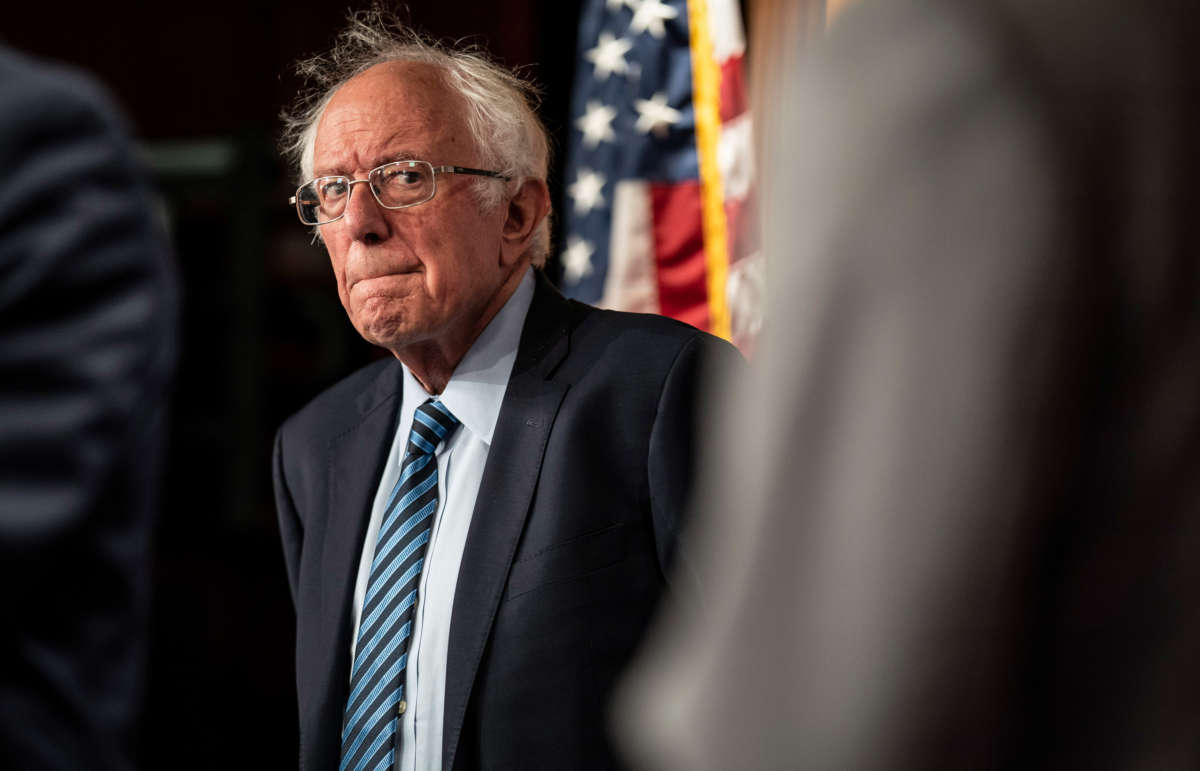Support justice-driven, accurate and transparent news — make a quick donation to Truthout today!
Sen. Bernie Sanders (I-Vermont) took to the Senate floor on Tuesday to point out glaring problems and inadequacies with the Inflation Reduction Act (IRA), which Democratic leaders recently announced after months of negotiations with coal millionaire Sen. Joe Manchin (D-West Virginia).
Warning about looming fascism and runaway capitalism in the U.S., Sanders harshly criticized Manchin and Democrats for excluding crucial provisions in the bill that were part of last year’s Build Back Better Act (BBBA), while inserting massive handouts to the fossil fuel industry in the face of a worsening climate crisis.
The roughly $433 billion bill, which was crafted from the framework of the BBBA, is much smaller than its predecessor – which, even at its lowest negotiated value, was at about $1.75 trillion. When Manchin killed the bill last year, Sanders heavily criticized the move at the time, and similarly said on Tuesday that the presumed death of the BBBA is “a disaster for the working families of our country who, today, are desperately trying to survive.”
While pointing out that polls have found that the BBBA and its various proposals were popular, Sanders noted that many of its provisions were carved out of this year’s reconciliation bill. Provisions like paid family and medical leave, the expanded child tax credit and universal pre-kindergarten would have helped to throw families a lifeline in the COVID economy, Sanders said. He added that the BBBA would also have addressed nationwide issues like soaring college tuition and prescription drug prices, skimpy Medicare coverage and the housing crisis.
However, Manchin and other lawmakers have slashed or completely eliminated those provisions. While the new bill does take some action on prescription drug prices, it will only allow Medicare to negotiate the price of some prescription drugs – not all drugs, as early versions of the BBBA would have done. And, while it would cap insulin prices at $35 a month for people with health insurance, it would do nothing for those without health insurance, Sanders pointed out.
Though he gave limited praise to provisions of the IRA that would extend and expand the Affordable Care Act, the Vermont senator said that the proposed health care provisions do not go nearly as far as needed to resolve major health care shortages in the U.S.
“This bill does nothing – absolutely nothing – to reform a dysfunctional, broken health care system which is based on the greed of the insurance industry, does nothing to address the fundamental crisis of the United States paying, by far, the highest prices in the world for health care, while over 70 million of us are uninsured or underinsured,” he said. “Doesn’t even touch that.”
Sanders also said that, while there are laudable clean energy provisions in the bill, it is far smaller than what the BBBA had proposed to tackle the climate crisis. Worse, the bill contains large concessions to the fossil fuel industry which climate advocates say would almost completely undermine the provisions aimed at reducing emissions.
“The very bad news that very few people in the media or in Congress want to talk about is that this proposed legislation includes a huge giveaway to the fossil fuel industry – both in the reconciliation bill itself and in a side deal that was just made public yesterday,” Sanders emphasized.
The proposed bill is so friendly to the fossil fuel industry that corporate executives from companies like Exxon have said that they’re pleased with the bill. Another huge concession that the bill contains is a mandate for the Interior Department to continue selling oil and gas leases annually over the next decade any time officials want to approve new wind or solar projects.
“Under this legislation the fossil fuel industry will receive billions of dollars in new tax breaks and subsidies over the next ten years on top of the $15 billion in tax breaks and corporate welfare that they are already receiving,” Sanders said. “In my view, if we are going to make our planet healthy and habitable for future generations, we cannot provide billions of dollars of tax breaks to the very same fossil fuel companies that are destroying the planet.”
The senator concluded by saying that, after months of secret negotiations between Democratic leaders and Manchin, “now is the time for every member of the Senate to study this bill thoroughly and to come up with amendments and suggestions as to how we can improve it,” he said. “I look forward to being part of that process.”
A terrifying moment. We appeal for your support.
In the last weeks, we have witnessed an authoritarian assault on communities in Minnesota and across the nation.
The need for truthful, grassroots reporting is urgent at this cataclysmic historical moment. Yet, Trump-aligned billionaires and other allies have taken over many legacy media outlets — the culmination of a decades-long campaign to place control of the narrative into the hands of the political right.
We refuse to let Trump’s blatant propaganda machine go unchecked. Untethered to corporate ownership or advertisers, Truthout remains fearless in our reporting and our determination to use journalism as a tool for justice.
But we need your help just to fund our basic expenses. Over 80 percent of Truthout’s funding comes from small individual donations from our community of readers, and over a third of our total budget is supported by recurring monthly donors.
Truthout has launched a fundraiser to add 379 new monthly donors in the next 6 days. Whether you can make a small monthly donation or a larger one-time gift, Truthout only works with your support.
